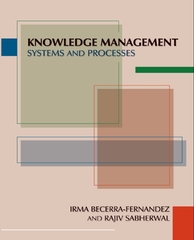Introduction
Becerra-Fernandez and Sabherwal (2010) define four main knowledge management processes:
- Knowledge discovery
- Knowledge capture
- Knowledge sharing
- Knowledge application
Each process comprises two sub-processes:
- Knowledge discovery includes Combination and Socialization.
- Knowledge capture includes Externalization and Internalization
- Knowledge sharing includes Socialization and Exchange
- Knowledge application includes Direction and Routines
This Learning Object "Knowledge Sharing Systems" describes systems and tools that can support the variety of ways in which knowledge sharing can be facilitated.
Knowledge sharing is the process through which explicit or tacit knowledge is communicated to other individuals. Typical Examples of Knowledge Sharing:
- Writing books or research papers
- Delivering a lecture or making a speech or presentation
- Participating in a dialogue over coffee or lunch
- Participating in Communities of Practice
- Mentoring a new staff; shadowing an expert
Depending on whether explicit or tacit knowledge is being shared, exchange or socialization processes are used.
Basic source for this learning object is: Becerra-Fernandez, I. and Sabherwal, R. (2010). Knowledge Management: Systems and Processes. Armonk (N.Y.); London: M.E. Sharpe.

|
Licensed under the Creative Commons Attribution Non-commercial No Derivatives 3.0 License
Sirje Virkus, Tallinn University, 2012